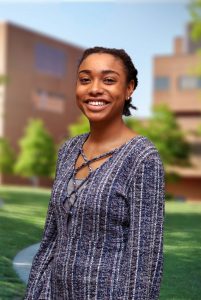Major: Geography and Environmental Science

Abstract: Nest Site Characteristics of the Bahama Oriole: Habitat Requirements of a Critically Endangered Species
Describe your project:
My project examines the nest site characteristics of the Bahama Oriole. I am interested in determining the habitat requirements of this critically endangered species in order to make suggestions for national parks and protected areas.
Who is your mentor(s) for your project?
Why did you choose them? My mentor is Dr. Kevin Omland, UMBC Biology Department. My mentor was my Biology 142 teacher and I chose him because I felt like his research projects and my interests aligned well. At the time I did not know of a lot of people whose research focused on conservation and I have always had an interest in birds.
How did you become interested in this project?
I became interested in this project because of my passion for conservation and research. I had also never gotten the opportunity to travel much or do any field work but I knew that was something I was interested in.
My career goals are to go to a masters program where I can combine my three passions: research, animal care and education. ~ Briana Yancy
What has been the hardest part about your research/what was the most unexpected thing about being a researcher?
The hardest part about my research was the travel. I was not used to going far away, especially without my parents. My anxiety tried to get the best of me but my lab family helped to support me and make me feel okay.
What has been the most rewarding part?
The most rewarding part is the outreach and effect on the community in the Bahamas this project has had. Every year we run into people who have our cards or have heard of us and want to help. They end up showing us nests or giving us valuable information about the birds and they always like to learn more about the project and how we are doing.
How will you disseminate your research?
I will present at URCAD in April.
What is your advice to other students about getting involved in research?
My advice to other students about getting involved in research is to get started as early as you can and do not be afraid to work in a lab that follows your interests but not necessarily your major. At first I thought I might not be able to work in a biology lab because my major is environmental science but I fit in perfectly.
What are your career goals?
My career goals are to go to a masters program where I can combine my three passions: research, animal care and education. I want to work with institutions, zoo, and aquariums in order to improve facilities, introduce more conservation programs of endangered species and habitat restoration while greatly increasing community engagement.
8/28/18